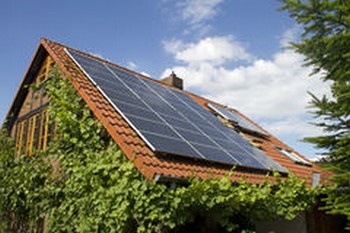Solar energy has many benefits, both for housing and the environment. Solar energy is generated when sunlight hits the photovoltaic panels causing electrons to flow, creating electricity.
Solar energy is sustainable and renewable; we can never run out of it as long as the sun exists and is capable of producing light (so forever, basically). Solar energy is a silent, efficient and seamless electricity generator and you can even receive a tax credit for it (Solar Renewable Energy Certificate).
When it comes to solar power, there are two main types: on-the-grid and off-grid, each with its own advantages and disadvantages.
Here are five major differences between on-grid and off-grid solar energy.
1. Percentage of Electricity Produced
On-the-grid (also known as “grid-tied”) solar power does not need to generate 100% of the solar power used by buildings because it is connected to a commercial grid. Wherever solar power is lacking, it is supplemented by the electric company. In contrast, off-grid solar energy generates all the energy a building needs and is not tied to the grid, meaning it is a stand-alone system.
2.Battery
Off-grid solar power systems require batteries to store excess solar power for use on days when there is no sunlight. This way, you’ll always have a spare energy and won’t be left out in the dark when it rains. On-grid solar systems, when there is no sunlight, rely on commercial utilities to the grid to provide electricity. Therefore, they do not require a storage system and do not require a battery.
3. Power Outage
In the event of a power outage, off-grid solar power is superior. Even if everyone’s power goes out due to a network failure or other outage, systems that are off the grid will still be running and won’t go dark. On-the-grid solar power will be turned off in the event of a blackout for safety reasons.
4. Monitoring System
Both on-grid and off-grid solar power have monitoring systems, but the purpose and function of each monitor is slightly different. On-the-grid solar models have a system that tracks energy production—this monitor is usually optional. The off-grid system has a monitor that functions to ensure a balance between energy production and energy consumption.
This monitor is not optional. The off-grid system also has a charge controller that protects the battery bank and prevents it from overcharging. Both systems still have the necessary safety equipment (breakers, breakers, fuses, etc.) and, of course, both require solar panels. There are only a few differences in how each is created and implemented.
5. Solar Renewable Energy Certificate (SREC)
This certificate is a tax incentive that only grid-tied solar power producers receive. SREC is awarded in states that have a Renewable Portfolio Standard that requires energy producers to generate a portion of their electricity from solar power. SREC is distributed for each hour of solar energy generated. One SREC equals one MWh of solar electricity.
For reference, a typical 10 kW facility produces twelve SRECs annually. Off-grid systems cannot take advantage of this SREC because the power does not flow to commercial grids; therefore, they are not part of this exchange and cannot take part in these “tradable environmental commodities”.
On-grid and off-grid solar technologies differ in construction and implementation, and each form of solar power has advantages and disadvantages. To find out which one is right for your home, consider undergoing an energy audit that will determine if solar power, whether grid-connected or standalone, is right for where you live. Companies like Bob Heinmiller Solar can help you turn your home into a solar powered pedestal.
Lautaro Martinez, a green enthusiast is always looking for ways to incorporate solar energy into his home. If you want to learn more about green living, you can visit Lautaro google+ profile.








